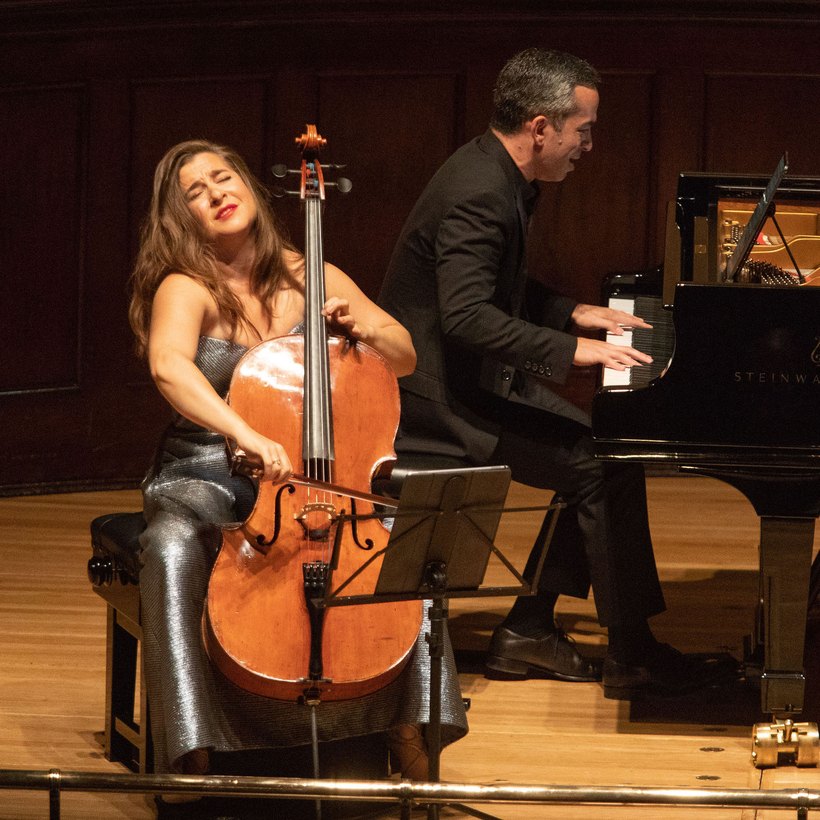You gotta have a gimmick! The strippers in Gypsy knew what they were squawking about. Even in the classiest classical career, a gloss of novelty always spruces up the brand. Be a champion! Be a muse! Add, if you can, a touch of theater!
Grounded by the pandemic, the superstar cellist Alisa Weilerstein came up with a bold new challenge for herself that checks all the boxes. Under the umbrella title Fragments, the multi-year work in progress mixes and matches the 36 movements of J. S. Bach’s six cello suites, BWV 1007–1012, with 70 shorts from a cohort of 27 living composers. I’ve done the math. The ask from each composer was 10 minutes of material, divided into two or three self-standing statements. Weilerstein’s recording of the suites (including some repeats she might not take in Fragments) clocks in at 160 minutes. Once completed, Fragments will comprise six concert programs lasting “a soft hour” each, suitable for à la carte soirées and special-event marathons.
Weilerstein’s spirit of discovery has been flaming bright since she was in her teens. Apart from Olympian readings of the warhorses, her résumé lists premieres from contemporary heavyweights such as Osvaldo Golijov, Lera Auerbach, and Matthias Pintscher. The foreordained MacArthur Fellowship came to her in 2011, when she was just 29. Fragments makes its debut in Toronto on January 28.
MATTHEW GUREWITSCH: Are you shuffling programs from evening to evening à la John Cage, or is each program set?
ALISA WEILERSTEIN: Each program is completely intentional and set. That’s crucial. I’m curating the order, and out of all the individual fragments, I’m weaving together an entirely original whole.
M.G.: I can’t help thinking of the Viennese music publisher Anton Diabelli, who asked every composer he could think of to send him a variation on a silly little waltz he had written. The idea was to publish the whole set as an album. Fifty composers did what he asked—but Beethoven wrote a whopping 33 new takes, the monumental freestanding masterpiece we know as the Diabelli Variations. Any such over-achievers in your lineup of composers?
A.W.: Generally, everyone adhered to my request. There are a couple over-achievers, but ultimately that’s a blessing. I look forward to playing the new material as stand-alone concert works as well!
M.G.: I’m wondering if there might be a parallel between Fragments and Rendering, in which Luciano Berio fused together scattered pages from an unfinished Schubert symphony with transitional material of his own. The new stuff was bona-fide Berio, not faux Schubert, but you couldn’t always tell where the breaks were.

A.W.: There’s some analogy there, for sure! The composers I’ve chosen have a very wide range of compositional styles. Some are neo-Baroque, so sometimes it will be hard to tell where new music starts and Bach ends or the other way around. In a couple pieces, one can find very direct quotes.
M.G.: You were in your teens when Yo-Yo Ma came out with his famous videos marrying each of the Bach cello suites to some other discipline, from Kabuki to gardening. Did they strike you as transgressive? As cool?
A.W.: I thought they were really adventurous! I watched them all several times. The videos gave me a sense of the relevance of Bach, of the contemporary nature of his music.
M.G.: The credits for Fragments list Hanako Yamaguchi, long a driving force at Lincoln Center, as artistic producer and adviser; and also Elkhanah Pulitzer as director, Seth Reiser as set-and-lighting designer, and Carlos J. Soto as costume designer. Sounds like you’re all creating a whole synesthetic theatrical package.
A.W.: We’ll have different Easter eggs, as it were. The set pieces are modular, so they can be set up in very different configurations. They also have built-in lighting elements, distinct from the overall lighting for the stage. There’s no set narrative, but the visuals create a unifying force. The idea is to use the different elements to help people listen more deeply.
M.G.: The whole project sounds exactly like what the MacArthur Foundation might have been hoping for when they made you a fellow.
A.W.: I’ve thought that, too! It would have been interesting if they’d chosen me now! The thing I admire most about the MacArthur Foundation is that, along with “lifetime achievement” awards, they also recognize potential for creativity. That helped give me the confidence and freedom to do this.
Fragments will premiere at Koerner Hall, in Toronto, on January 28
Matthew Gurewitsch writes about opera and classical music for AIR MAIL. He lives in Hawaii

